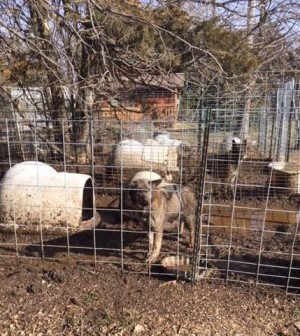- Do you subscribe to Dharma Dog Training’s Newsletter? You should.
- A Unique Campaign from The Humane Society of the United States
- Rabid bats in Omaha- Stay safe, prepared with these tips
- Springtime Activities in Omaha
- Mill Dog Monthly from Bailing Out Benji
- World Spay Day, Legislative Alert in Nebraska
- Attend the Nebraska Rescue Council’s monthly meeting this Saturday
- Five Hard-to-Ignore Reasons to Adopt!
- Paws in Pink to Benefit Breast Cancer Foundation
- VCA, Inc. Acquires MidWest Vet Specialists from Kansas State University
The 100 Worst Puppy Mills in 2018 – The Horrible Hundred (including 6 in Nebraska)

Each year, the Humane Society of the United States, as part of its campaign against puppy mills, publishes its list of the worst 100 mills in America. The list is always popular and used for a variety of things.
For our purposes here (promoting adoption), we’re sharing the list to illustrate the dreadful conditions that animals live in. The dogs in these mills produce thousands of puppies each year, being bred every heat cycle, and those pups are sold to pet stores and pet brokers. If you read about the conditions in the mill, it’s not difficult to think twice before visiting that pet store, responding to an ad in the newspaper, or looking through listings of animals for sale online. Pet store dogs are mill dogs and the only way to stop the mills is to stop buying the dogs they produce.
Read the entire list and the reasons each mill has been included.
Nebraska, once again, is one of eight states to have more than five mills on the Horrible 100 list. Nebraska has ranked in the top 10 for years and the lack of legislation, plus our myriad discreet locations, proximity to major interstates, and a growing list of places on the web to buy animals, it seems as if we’re cemented here for a while.
Nebraska currently has 6 mills on the list, some being repeat offenders on the yearly list. Read a bit about each one below and remember to always go the shelter or rescue route when getting a new dog!
Fort Calhoun, Nebraska: Jeff Dross – Failed state inspection after inspector found rodent and insect infestations; feces not cleaned for five to seven days; dogs were only given fresh water “about twice a week.”
Grand Island / Wood River, Nebraska: Mark Griesman, Prairie Chesapeakes –Received warning from the state; dog with wound hadn’t been taken to a vet two days later; insufficient food, water and shade; unacceptable veterinary care; dangerously decrepit
housing.
Orchard, Nebraska: Diana Burden, Tall Pines Kennels (REPEAT OFFENDER)– Online seller received official warnings from the state in 2017 and 2016; puppies found in the cold, many without bedding in 46 degree room; inspectors repeatedly found unsanitary conditions; ordered facility to downsize. Even after appearing in our prior Horrible Hundred report after the state of Nebraska gave her a warning for numerous violations, Diana Burden received another warning from the state just a few months later, in July 2017. In an August 2017 letter, the state department of agriculture requested that Burden downsize to 50 dogs within 10 days, and placed conditions on her license, including better cleaning, providing updates to the department on required animal housing improvements, and an increased number of inspections. Burden was also required to refrain from any repeat violations and to get permission from the state in the future if she was to increase her stock of dogs.
This compliance plan was due to violations found at inspections between October 2016 and July 2017. Burden did manage to have some compliant inspections after the agreement was reached (Aug. 29, 2017, Oct. 11, 2017 and Nov. 15, 2017). But in December 2017, more violations were found. Burden was cited for two different direct violations when puppies were found in rooms that were only 45.7 degrees and 46 degrees respectively. Bedding was only seen in a few pens, but the law requires bedding to be provided to all dogs and puppies when temperatures are below 50 degrees.
Newport, Nebraska: Milton Lewis, Rock Hill Dog Ranch – Egregious problems with sick and injured dogs; one puppy had a leg torn off, according to state report; owner euthanized 14 unwanted dogs and puppies, refusing offer to send them to rescues; some were euthanized only because of burrs stuck in their fur. The Nebraska Department of Agriculture received a complaint on Sept. 18, 2017 about Milton Lewis’ breeding operation in Newport. The complainant claimed to have inside knowledge and stated that even though the operation had passed a June 2017 inspection, it had only done so by hiding injured dogs and concealing some of the dogs in other locations on the property that the inspector never visited. In addition, the complainant said that the dogs did not get regular food and water, and the facility had a high rate of puppy mortality.
Two days after receiving this complaint, state inspectors visited Lewis’ facility and began what would become a very long, extensive, and horrific follow-up report. After arriving on the property, the inspectors first observed that almost all of Lewis’s dogs were out of their pens, huge holes had been dug to escape the pens, and puppies and adults were running together. They saw no shelters in the pens and several large holes dug in the ground so deep, “you could not even see the dog in them.” There was “a large accumulation of feces” and “junk/trash” in the pens and yard.
One inspector noted that a golden retriever with its head in a hole appeared to be dead but, “[Lewis] said it wasn’t dead but it had gotten in a fight with the other dogs. [The inspector] asked to go in and look at the dog but [Lewis] wanted to bring the dog out to her. When [Lewis] put the
dog on the ground, all the dogs around us started attacking the Golden Retriever in a pack like mentality. [Lewis] had to fight the dogs off the Golden [until he] could get her back into her pen.” The dog was then inspected inside of the pen and was found to have “puncture wounds” on her back leg and a swollen eye. “[The inspector] asked if he was going to take the dog to the vet and he said he had texted her and he was to give it an antibiotic. He showed [the inspector] the text he sent at 11:08 am which was after we had arrived at his facility.”
Swanton, Nebraska: Mitch and Alisa (Alica) Pesek (REPEAT OFFENDER) – AKC-linked breeder repeatedly found keeping dogs outside without adequate protection from the weather; cited for underweight and wounded dogs several years in a row. AKC breeder Alisa Pesek has appeared in three of our prior Horrible Hundred reports for keeping dogs outside without enough protection from the weather and for underweight and injured dogs, yet state inspectors again found similar issues after our last report was published.
Related Posts
Latest News
-
What Signs to Look For When My Pet Has a Cold
You have probably heard the expression, “sick as a dog.”...
- Posted 1 week ago
- 0
-
How Often Should I Groom My Pet?
Do you have a grooming ritual for your furry friend?...
- Posted 2 weeks ago
- 0
-
From Kibble to Cuisine: Finding the Perfect Food For Your Pet
Do you ever wonder what the difference is between regular...
- Posted 1 month ago
- 0
-
The Essential Guide to Pet Care: Meeting Your Furry Friends Basic Needs
Are you a first-time pet owner and need to know...
- Posted 1 month ago
- 0
-
Say Cheese! Tips for Keeping Your Pet’s Pearly Whites Clean
Did you know that keeping your dog or cat’s teeth...
- Posted 2 months ago
- 0
-
Feeding Frenzy: How Often Should You Fill Your Pet’s Bowl?
Are you unsure how much food to give your dog...
- Posted 2 months ago
- 0
-
How to Prepare Your Pet for Spring
Winter is in full force, but spring will be here...
- Posted 2 months ago
- 0























You must be logged in to post a comment Login